Did Isa (AS) travel after persecution?
Introduction
In previous articles we proved the death of Isa (AS), reality of the Nuzul of Isa, and that Jesus (AS) was put on the cross but survived
In this article we will prove that Isa (AS) did not die on the cross, but instead migrated after he was persecuted. Sunnis think this is an absurd interpretation, and believe that Isa (AS) was taken up to heaven before the Jews tried to put him on the cross. This article will show how Sahih Ahadith and the Holy Quran support the Ahmadiyya view of Isa (AS) travelling after persecution, and how the Non-Ahmadi narrative opposes the Quran and Sahih Ahadith.
The Holy Quran
The Holy Quran which is the greatest of all testimonies bears witness to the migration of Isa (AS) and his mother Maryam (AS) to an elevated land having meadows and springs of running water.
وَجَعَلۡنَا ابۡنَ مَرۡیَمَ وَاُمَّہٗۤ اٰیَۃً وَّاٰوَیۡنٰہُمَاۤ اِلٰی رَبۡوَۃٍ ذَاتِ قَرَارٍ وَّمَعِیۡنٍ
And We made the son of Mary and his mother a Sign, and gave them refuge on an elevated land having meadows and springs of running water.
or an alternate translation:
And We made the son of Mary and his mother a Sign, and We rescued them and helped them reach an elevated land, a restful place with springs of running water.
[Holy Quran 23:51]
This verse proves that after being persecuted in Palestine, Isa (AS) and his mother Maryam (AS) were given refuge on an elevated land which was lush, full of meadows, and had abundant springs – this being a clear description of Kashmir. There he died at the ripe old age of 120 years. This interpretation is in line with the two Sahih Ahadith which narrate the migration and death of Isa (AS) as mentioned below. Thus this verse proves that Isa (AS) did indeed migrate with his mother towards to the East after being persecuted.
If Non-Ahmadis wish to put forward another interpretation of this verse, they must first refute the two Sahih Ahadith mentioned below concerning the migration and death of Isa (AS).
The Ahmadi Interpretation is supported by the two Sahih Hadith, while the Non-Ahmadi Narrative is refuted.
To read more about the refutations of Non-Ahmadi interpretations of this verse, click here
Hadith 1
حب شيء إلى الله تعالى الغرباء الفرارون بدينهم، يبعثهم الله يوم القيامة مع عيسى ابن مريم
The Holy Prophet (SAW) said: “Dearest to Allah are the strangers (Ghurabah) who flee (their homelands) with their Faith. On the Day of Judgment Allah will raise them with Isa ibn Maryam (AS).”
[Kanzul Ummal 3/153 H.5930 cf. Abu Na’im]
This hadith shows/proves 3 things:
- Allah loves those who had to flee their homelands with their faith, these are the Ghurabah
- Isa ibn Maryam (AS) is also among the strangers (Ghurabah) who had flee their homelands with their faith
- Allah will thus raise the Ghurabah with Isa ibn Maryam (AS) on the Day of Judgement
This hadith makes it clear that Isa (AS) was not crucified and had to flee Palestine as a consequence of persecution due to his faith. If Isa (AS) was not among the Ghurabah (those who had to flee their homelands with their faith), why would the Ghurabah be raised with him on Qiyamah?
Authenticity of Hadith #1:
This Ghurabah hadith is Sahih, as it has 2 authentic chains:
1st Chain: Imam Ahmad bin Hanbal (RH) has put it in his Al-Zuhd, p. 123, #809:
حَدَّثَنَا عَبْدُ اللَّهِ ، حَدَّثَنِي سُفْيَانُ بْنُ وَكِيعٍ ، حَدَّثَنَا عَبْدُ اللَّهِ بْنُ رَجَاءٍ ، عَنِ ابْنِ جُرَيْجٍ ، عَنِ ابْنِ أَبِي مُلَيْكَةَ ، عَنْ عَبْدِ اللَّهِ بْنِ عَمْرٍو قَالَ : قَالَ رَسُولُ اللَّهِ صَلَّى اللَّهُ عَلَيْهِ وَسَلَّمِ
Sanad: Abdullah -> Sufyan bin Waqiya – > Abdullah bin Rija’- > Ibn Jurayj – > Ibn Abi Mulyka -> Abdullah bin Umar (RA)- > Muhammad (SAW)
People take issue with Sufyan bin Waqiya, but he is accepted.
- Imam Ahmad bin Hanbal (RH) said that he heard nothing but good concerning Sufyan bin Waqiya. You can find the scan here
- Ibn Hibban called him Sudooq and a virtuous old sheikh. You can find the scan here
- Imam Bayhaqi called him Sudooq. You can find the scan here
- Ibn Shaheen called him pious. You can find the scan here
- In Tahzeeb ul Kamil, it testifies to the truthfulness of Sufyan bin Waqiya quoting many that call him Sudooq etc. You can find the scan here
Reflecting on this evidence and the testimony of the classical scholars, there remains no doubt that Sufyan bin Waqiya is truthful, and that this chain is Sahih. Apart from this chain there is an entirely different chain that is also graded Sahih in Kitabul Fitn, as quoted below.
2nd Chain: In Kitabul Fitn [Hadith #167], there is an entirely different chain which streches up to Abdullah bin Umar (RA) which is graded Sahih and leaves no doubt that this hadith is authentic:
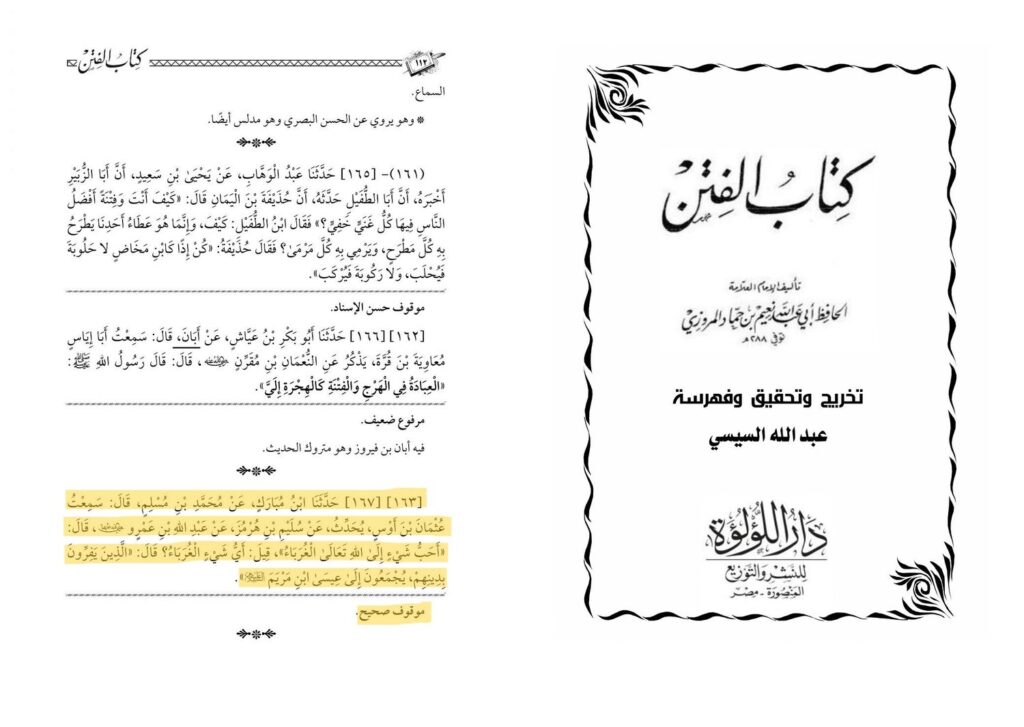
Hadith 2
حَدَّثَنَا يَحْيَى بْنُ أَيُّوبَ الْعَلَّافُ الْمِصْرِيُّ، ثنا سَعِيدُ بْنُ أَبِي مَرْيَمَ، ثنا نَافِعُ بْنُ يَزِيدَ، حَدَّثَنِي عُمَارَةُ بْنُ غَزِيَّةَ، عَنْ مُحَمَّدِ بْنِ عَبْدِ اللهِ بْنِ عَمْرِو بْنِ عُثْمَانَ، أَنَّ أُمَّهُ، فَاطِمَةُ بِنْتُ حُسَيْنٍ حَدَّثَتْهُ، أَنَّ عَائِشَةَ كَانَتْ تَقُولُ: إِنَّ رَسُولَ اللهِ صَلَّى اللهُ عَلَيْهِ وَسَلَّمَ فِي مَرَضِهِ الَّذِي قُبِضَ فِيهِ، قَالَ لِفَاطِمَةَ: «يَا بُنَيَّةُ احْنِي عَلَيَّ» فَأَحْنَتْ عَلَيْهِ فَنَاجَاهَا سَاعَةً ثُمَّ انْكَشَفَتْ وَهِيَ تَبْكِي وَعَائِشَةُ حَاضِرَةٌ ثُمَّ قَالَ رَسُولُ اللهِ صَلَّى اللهُ عَلَيْهِ وَسَلَّمَ بَعْدَ ذَلِكَ بِسَاعَةٍ: «احْنِي عَلَيَّ يَا بُنَيَّةُ» فَأَحْنَتْ عَلَيْهِ فَنَاجَاهَا سَاعَةً ثُمَّ انْكَشَفَتْ عَنْهُ فَضَحِكَتْ قَالَتْ عَائِشَةُ: فَقُلْتُ: أَيْ بُنَيَّةُ، أَخْبِرِينِي مَاذَا نَاجَاكِ أَبُوكِ؟ فَقَالَتْ فَاطِمَةُ: نَاجَانِي عَلَى حَالٍ سِرٍّ، ظَنَنْتِ أَنِّي أُخْبِرُ بِسِرِّهِ وَهُوَ حَيٌّ فَشَقَّ ذَلِكَ عَلَى عَائِشَةَ أَنْ يَكُونَ سِرًّا دُونَهَا، فَلَمَّا قَبَضَهُ اللهُ، قَالَتْ عَائِشَةُ لِفَاطِمَةَ: يَا بُنَيَّةُ، أَلَا تُخْبِرينِي بِذَلِكَ الْخَبَرِ؟ قَالَتْ: أَمَّا الْآنَ، فَنَعَمْ، نَاجَانِي فِي الْمَرَّةِ الْأُولَى فَأَخْبَرَنِي أَنَّ جِبْرِيلَ صَلَّى اللهُ عَلَيْهِ وَسَلَّمَ كَانَ يُعَارِضُهُ بِالْقُرْآنِ فِي كُلِّ عَامٍ مَرَّةً، وَأَنَّهُ عَارَضَهُ بِالْقُرْآنِ الْعَامَ مَرَّتَيْنِ، وَأَخْبَرَنِي أَنَّهُ أَخْبَرَهُ أَنَّهُ لَمْ يَكُنْ نَبِيٌّ إِلَّا عَاشَ نِصْفَ عُمَرَ الَّذِي قَبْلَهُ، وَأَنَّهُ أَخْبَرَنِي أَنَّ عِيسَى ابْنَ مَرْيَمَ عَاشَ عِشْرِينَ وَماِئةَ سَنَةٍ وَلَا أُرَانِي إِلَّا ذَاهِبًا عَلَى رَأْسِ السِّتِّينَ فَأَبْكَانِي ذَلِكَ وَقَالَ: «يَا بُنَيَّةُ، إِنَّهُ لَيْسَ مِنْ نِسَاءِ الْمُسْلِمِينَ امْرَأَةٌ أَعْظَمُ رُزِّيَّةً مِنْكِ، فَلَا تَكُونِي أَدْنَى مِنِ امْرَأَةٍ صَبْرًا» وَنَاجَانِي فِي الْمَرَّةِ الْآخِرَةِ فَأَخْبَرَنِي أَنِّي أَوَّلُ أَهْلِهِ لُحُوقًا بِهِ وَقَالَ: «إِنَّكِ سَيِّدَةُ نِسَاءِ أَهْلِ الْجَنَّةِ إِلَّا مَا كَانَ مِنَ الْبَتُولِ مَرْيَمَ بِنْتِ عِمْرَانَ» فَضَحِكَتُ بِذَلِكَ
“The Holy Prophet (SAW) said, ‘Gabriel informed me that every successive prophet has lived to half the age of his predecessor. And verily Jesus, son of Mary, lived to 120 years. Therefore, I perceive that I may reach the age of 60.”
[Al Mu’jam Al Kabir Tabarani, 1031, 22/417]
This hadith proves 3 things:
- Isa (AS) passed away before the Holy Prophet (SAW), like any other prophet on Earth.
- Isa (AS) did not physically ascend to heaven as he passed away.
- Isa (AS) had lived his life to the ripe old age of 120 years, which means that Isa (AS) survived the attempt of crucifixion and lived a long life afterwards.
Some critics question the authenticity of this hadith, but in another article (Isa (A.S) died at the age of 120) we have already proven that this hadith is Sahih.
‘Masih’ means traveller
Another point that supports that Isa (AS) left Palestine and migrated is that the word Masih itself means traveller. This is further proof that Isa (AS) did indeed migrate.
Fatawa Islamiya
In Fatawa Islamiyah, a famous book of the Salafis written by eminent Sunni scholars it is written that:
Some of the Salaf also said that he was called Al-Masih due to his contact with the earth and his frequent travelling therein for the propagation of the religion. According to these two sayings, Al-Masih, meaning Maasih (one who touches). It was also said that he is Al-Masih because his feet were flat, with no hollow to the soles of his feet, and it was said that he was touched with blessings, or that he was purified from sins and was therefore blessed; in these cases, Al Masih would mean Mamsuh (one who is touched), but the first is the most apparent, and Allah knows best.
[Fatawa Islamiyah Volume 1 p. 309]
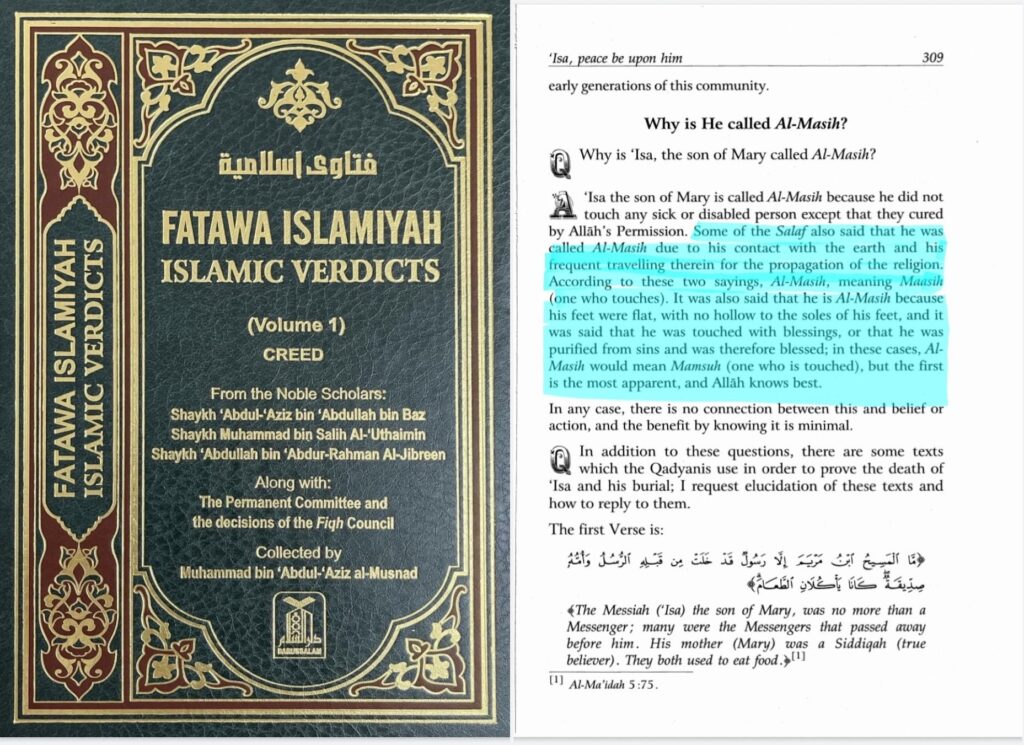
Encyclopaedia of the Quran
In Encyclopaedia of the Quran Volume 3 it is written:
Finally, there were those who maintained that although masih had the force of an active participle it was derived not from masaha but from saha, a verb meaning to travel about in the cause of religion (Q 9:2; see JOURNEY) and hence to be devout (Q 9:112; 665; see also FASTING). They alleged that Jesus received this nickname because of his itinerant life-style (see further Arnaldez, Jésus på de Marie, 84-7).
[Enclycopaedia of the Holy Quran Vol 3, p. 12]
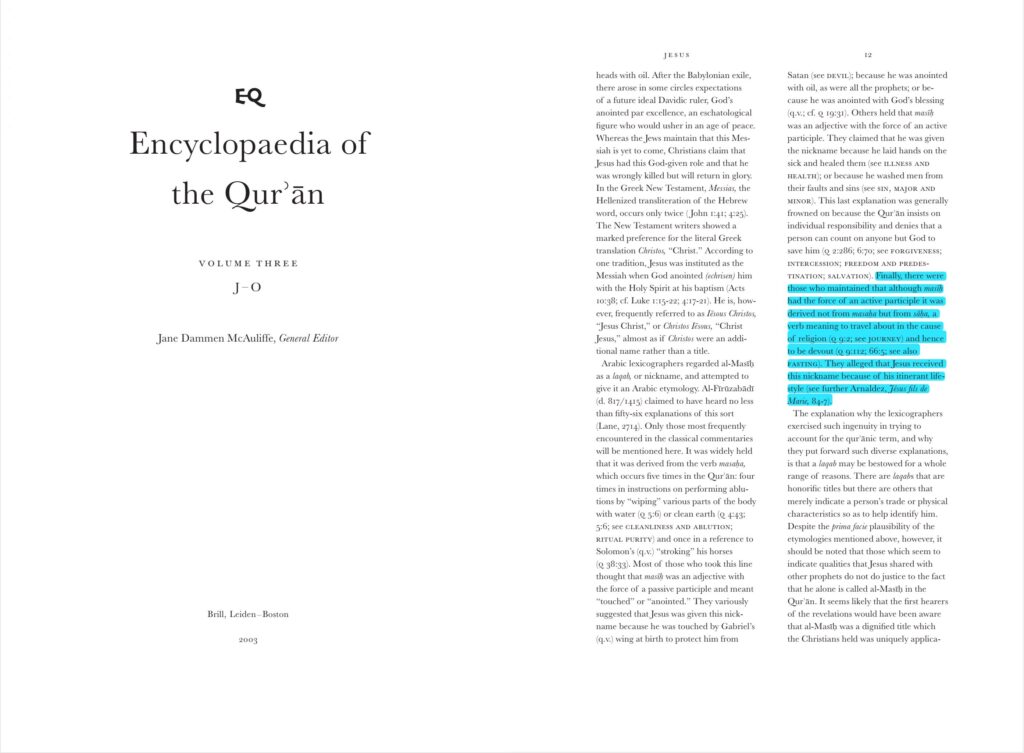
Arabic-English Dictionary of Qur’anic Usage
In “Arabic-English Dictionary of Qur’anic Usage” by Abdul Hadeem, one of the most popular academic dictionaries, it is written:
“م/س/ح m . s . h […]to travel in the land; to cut off, to smite.[…] المسيح al-Masih [proper name] litearlly the annointed; the traveller”
[Arabic-English Dictionary of Qur’anic Usage p. 880-881]
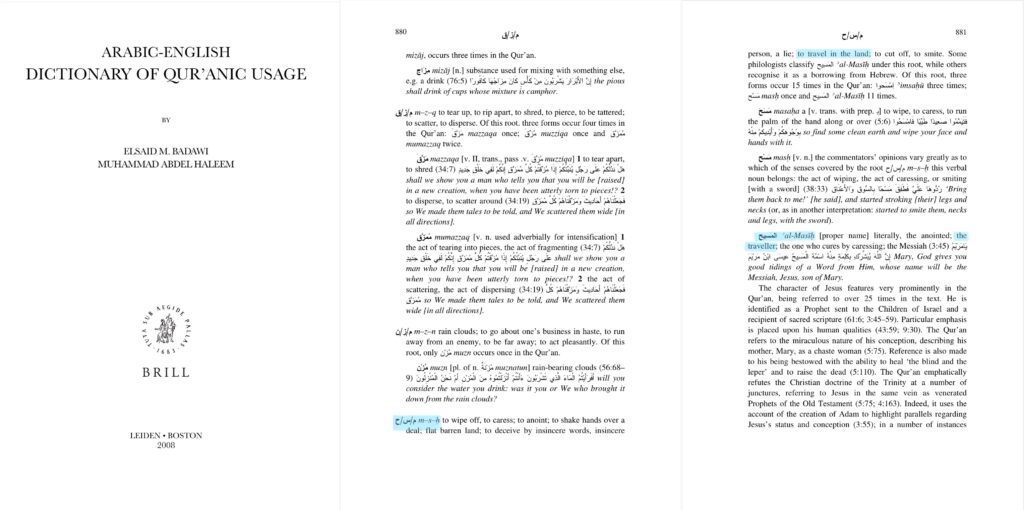
Lughat ul Quran – Dictionary of Quran
In Lughat ul Quran – Dictionary of Quran by Ghulam Ahmad Pervez it is written:
“مَسَحَ الْاَرْضَ”(masahal ard): he measured the ground or land, or surveryed it {T}.
“اَلْمِسْحُ” (al-mish): path.
“اَلْمَسِيْحُ”(al-maseeh): a man who walks too much or is a big traveller {T}.Ibn Faris says the basic meanings are to spread something out and to make something traverse some path.
Isa (Jesus) has also been called “مَسِيْحٌ” (maseeh) in (3:44). Qamoos has written out fifty instances of this in Kitaabil Ashqaaq {T}. One of them is, and Raghib has supported it too, that since Jesus used to walk a lot, he was called “مَسِيْحٌ” (maseeh).
Raghib also says that in those days there were many people who used to roam about and were called “مَشَّاءِيْنَ” (masha’een) or “سَيَّاحِيْنَ” (sayyaheen), and Jesus used to do likewise, hence he was called “” (masseeh).
[Lughat-ul-Quran Dictionary of Quran Volume IV, p. 57]
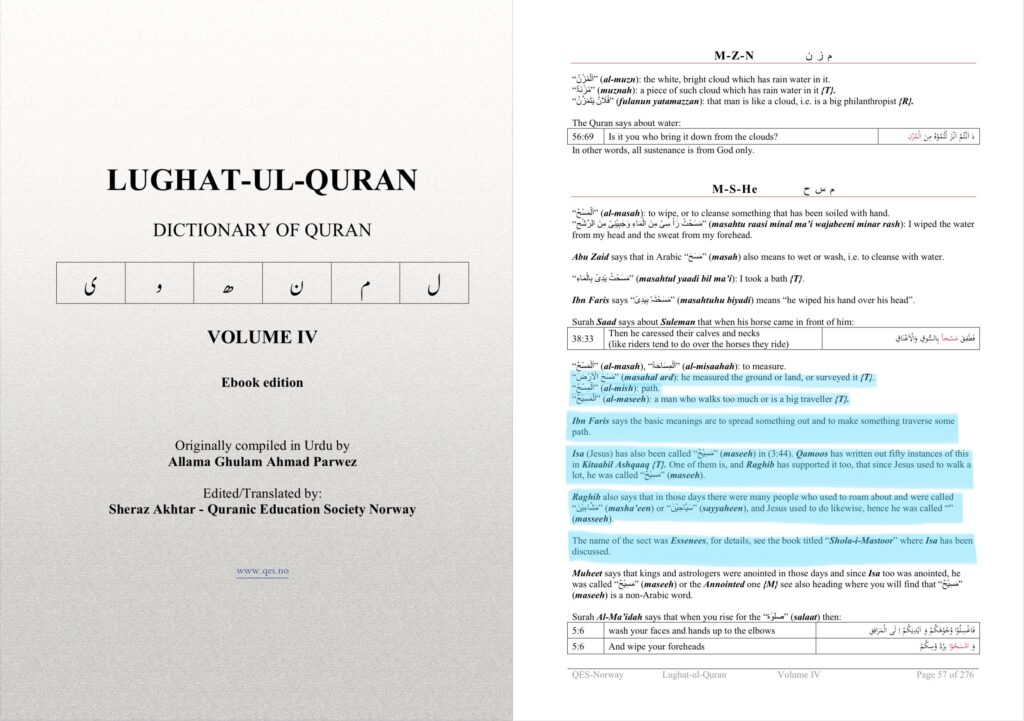
Nur ul Arfan Ala’ Kanz-ul Aiman
In the the most authoritative tafseer written on the translation of Ahmad Raza Khan (the founder of the Barelviyyah), his student Mufti Ahmad Yar Khan Naemi says:
“The word MASEEH means one who cures by touch and brings the dead to life or one who travels to a distant place. Maseeh is the appellation and Hazrat Isa (On him be peace) is his noble name.”
[Nur ul Arfan Ala’ Kanz-ul Aiman Surah al Fatiha – Surah al Anbiya p. 165-166]
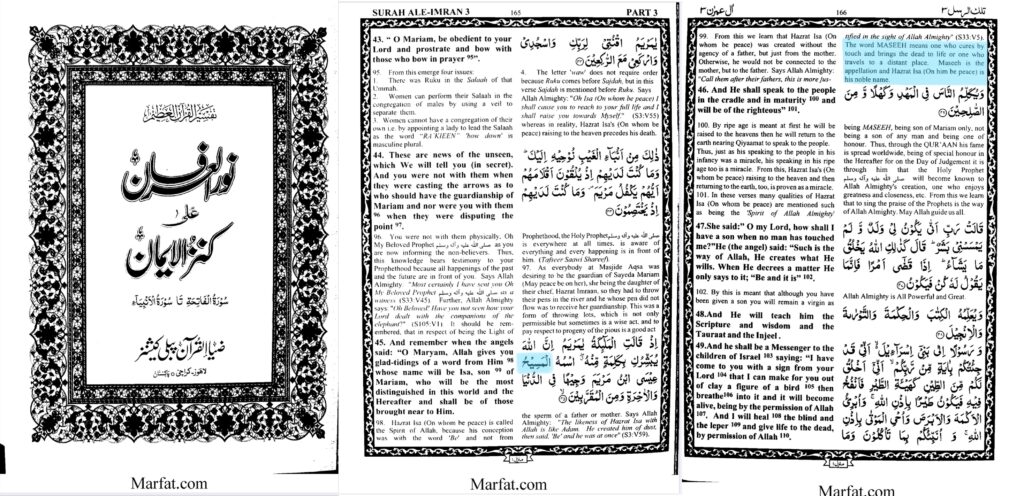
Lanes Lexicon
In Lanes Lexicon it is written:
“مَسَحَ فِى الأَرْضِ, inf. n. مُسُوحٌ, He set forth journeying through the land, or earth: (AʼObeyd, Ḳ:*) as also مَصَحَ. (TA.)”
“مَسَحَ الإِبِلَ, inf. n. مَسْحٌ ‡ He made the camels to journey all the day long: and he made the backs of the camels to be wounded by the saddles, and emaciated them; as alsoمَسَّحَهَا↓, inf. n. تَمْسِيحٌ: (Ḳ:) and in the latter sense you say مَسَحَ النَّاقَةَ, andمسّحها↓. (TA.)”
“مَسَحَتِ الإِبِلُ يَوْمَهَا ‡ The camels journeyed all the day. (Ṣ.) مَسَحَتِ الإِبِلُ الأَرْضَ يَوْمَهَا دَأْبًا ‡ The camels journeyed all the day laboriously. (TA.)”
“مَسِيحٌ One who journeys or goes about much for the sake of devotion, or as a devotee; as also مِسِّيحٌ↓ (Ḳ,) andأَمْسَحُ↓, (TA,) the fem. of which is مَسْحَآءُ. (Ḳ, TA.) See مَسَّاحٌ.”
[Lanes Lexicon p. 2713-2714]
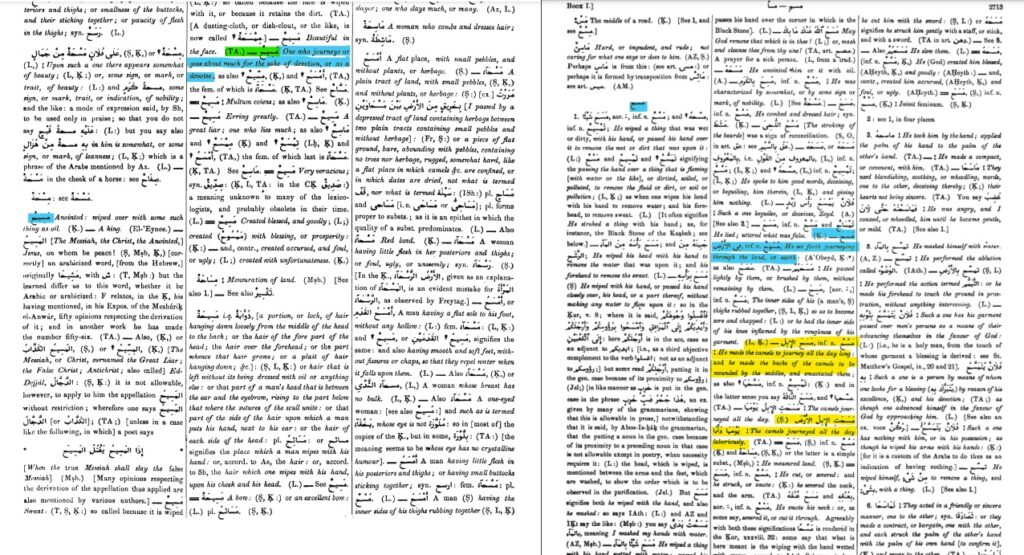
Jesus the Kalimatullah
In the book Jesus the Kalimatullah it is written:
“secondly, Jesus was a traveler and he used to move all around the country and therefore, his title could be read as Massih (an emphatic form of Masih) or ‘traveler’;”
[Jesus the Kalimatullah p. 49]
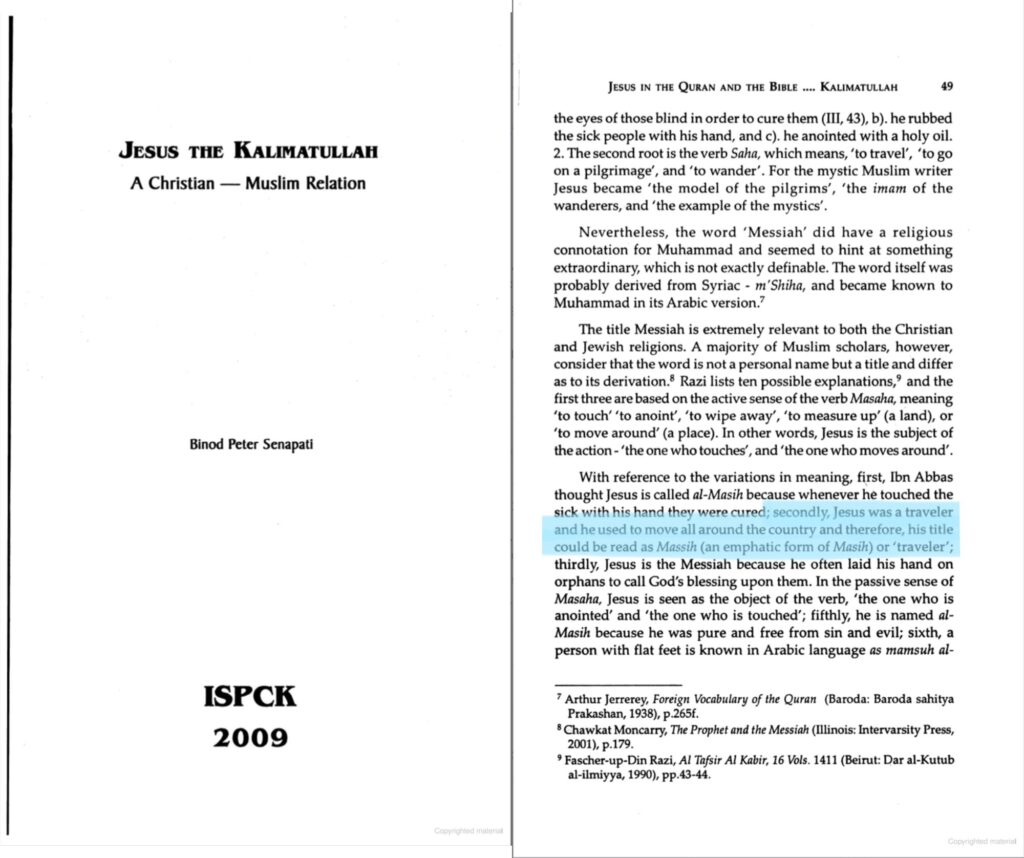
Migration of Isa (AS) in the Interpretation of Dreams
Another point which reveals the truth of the matter and is worthy of attention is that Muslim dream interpretors say the meaning of seeing Isa (AS) in a dream means to do hijrah/migration, and to escape misfortune. In no way is it ever interpreted as ascension to heaven.
Hazrat Mirza Ghulam Ahmad (AS) writes in his book Haqiqatul Wahi:
“2. ٭ It is noteworthy that Muslim interpreters of dreams take the sighting of Hadrat ‘Isa (as) in a dream to mean escape from a misfortune and migration to another land or moving from one place to another; it is never interpreted as ascension to the heavens. See Ta‘tirul-Anam and other books on dream interpretation. This is something that can manifest the truth of the matter to the wise. (Author)”
[Haqiqatul Wahi English p. 48, footnote #2]
In Ta‘tirul-Anam Volume 2, p. 75, this is exactly what is says, saying that: whoever sees Jesus (AS) in a dream will travel in the land and escape what he fears:
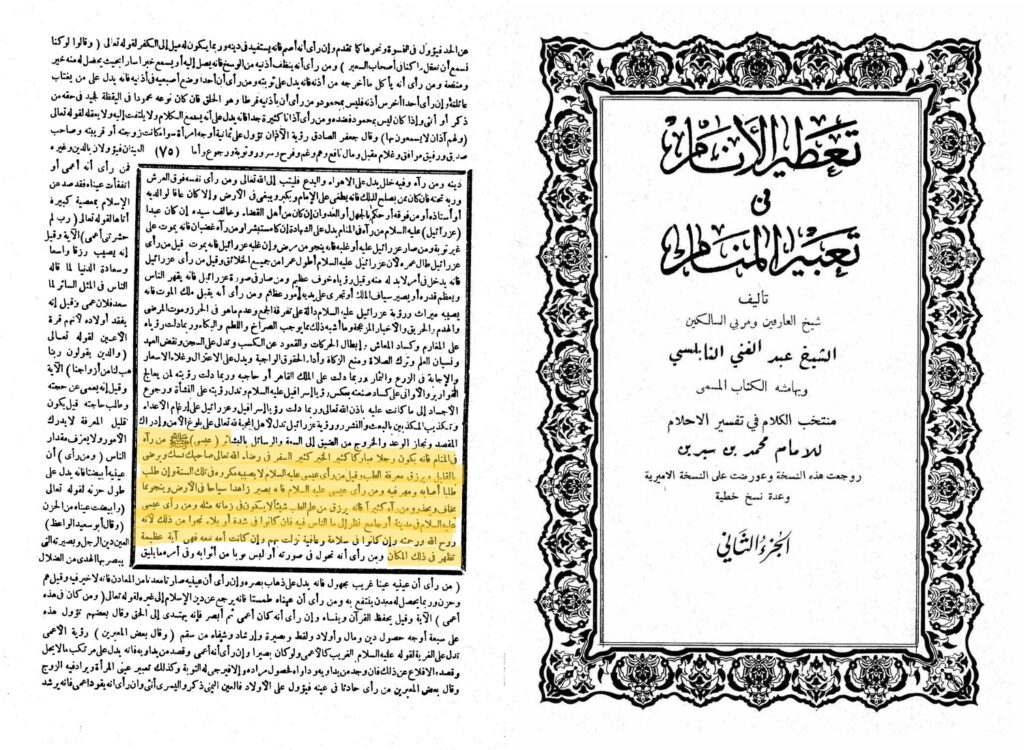
Morever in Hazrat Ibn Sirin (RH)’s ‘Dictionary of Dreams’ the same is written, and this interpretation is supported by Ta‘tirul-Anam:
One who sees God’s prophet Jesus upon whom be peace, in a dream is a blessed man, a generous one, an ascetic who pleases his Lord, who is filled with contentment, who travels excessively and may acquire knowledge about medicine and herbs. […] One who sees Jesus upon whom be peace, in a dream will become an ascetic, travels throughout the land, escape from his enemy and may become a renowned physician. Seeing Jesus and his mother, upon both of them be peace in a dream also could mean distress, sorrow, defamation, moving from one country into another, or it could mean miracles. […]
[Ibn Sirin Dictionary of Dreams English p. 232]
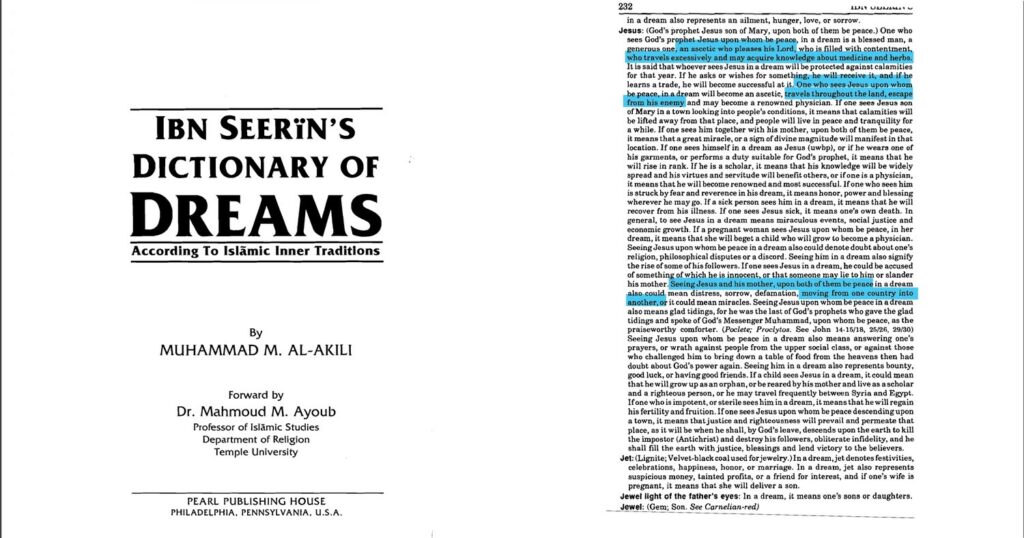
Conclusion
In conclusion, this article proves that:
- Isa (AS) and his mother Maryam (AS) were both given refuge on an elevated land when they left their homeland and after they faced hardships/persecution in Palestine. This interpretation is according to the Quran [23:51] and in line with the two authentic traditions.
- Isa (AS) left his homeland due to his faith (ie. migrated like the Ghurabah) according to Sahih Hadith #1.
- Isa (AS) died at the age of 120 years on this very earth after migrating, did not ascend to heaven, and survived the event of the cross according to Sahih Hadith #2.
- According to various sources, the meaning of the title ‘Masih’ is also traveller. This was a title given to him due to his excessive travelling.
- Even in the interpretation of dreams, seeing Isa (AS) means migrating from one country to another and to escape one’s enemy – it is never interpreted as ascension to the heavens.
After evaluating all this evidence, no doubt remains that Isa (AS) did indeed leave Palestine after facing persecution and travelled East to an elevated land, where he died at the age of 120 years.
